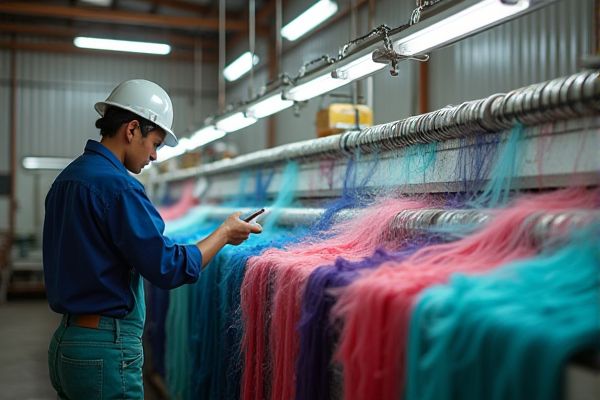
Vietnam's textile dyeing industry offers a variety of job opportunities, driven by its robust garment manufacturing sector. Roles include dyeing technicians, quality control specialists, and production managers, each playing a crucial part in maintaining standards and efficiency. The industry is increasingly adopting sustainable practices, creating roles focused on eco-friendly dyeing processes and materials. As demand for textile products rises globally, skilled workers in this sector can benefit from competitive salaries and career growth potential.
Job Description
Textile dyeing jobs in Vietnam involve a range of responsibilities including preparing fabrics for dyeing, mixing dyes according to specific formulas, and ensuring quality control throughout the process. Workers are required to operate dyeing machines efficiently while adhering to safety and environmental regulations. Knowledge of fabric properties and dye characteristics is essential for achieving the desired color and finish. Your attention to detail and ability to collaborate with team members contribute to the overall success and efficiency of the textile manufacturing process in Vietnam.
Requirement
Textile dyeing jobs in Vietnam typically require skills in color matching and an understanding of various dyeing techniques, including both natural and synthetic processes. Familiarity with fabric types and their dyeability is essential, as is knowledge of safety protocols and environmental regulations relevant to the industry. Experience with dyeing machinery and attention to detail are highly valued, ensuring high-quality outcomes in production. Certification in textile technology or related fields may enhance your job prospects in this competitive market.
Salary and Perks Expected
Textile dyeing jobs in Vietnam typically offer competitive salaries, ranging from approximately $400 to $800 per month, depending on experience and skill level. Many companies provide additional perks such as health insurance, paid leave, and opportunities for overtime that can significantly enhance your overall earnings. The demand for skilled dyeing technicians is growing in Vietnam's textile industry, driven by both domestic manufacturing and export needs. Job security and career advancement prospects are often favorable in this sector, making it an appealing option for many professionals.
Similar Job Names
- Dyeing Technician
- Dyeing Supervisor
- Color Matching Specialist
- Textile Dyeing Operator
- Quality Control Inspector
- Dye Production Manager
- Research and Development Chemist
- Process Engineer
- Fabric Dyer
- Dyeing Machine Operator
- Dye House Manager
- Environmental Compliance Officer
- Laboratory Technician
- Production Planner
- Industrial Engineer
Job Expectation Concept
Textile dyeing jobs in Vietnam involve a range of tasks, from preparing fabric to applying dyes and finishing processes. Your role may include operating dyeing machines, ensuring color consistency, and maintaining quality control standards. Knowledge of different dyeing techniques and color theory is essential for success in this field. As the textile industry in Vietnam continues to grow, opportunities for advancement and specialization in dyeing processes are becoming increasingly available.
Career Advantage and Weakness
Textile dyeing jobs in Vietnam offer significant career advantages, including a growing demand for skilled workers due to the country's expanding textile industry. You can benefit from diverse employment opportunities, ranging from small workshops to large factories, which enhances job stability and potential for advancement. However, a notable weakness is the environmental impact of dyeing processes, leading to concerns about workplace conditions and sustainability. This can affect job satisfaction and long-term viability, making it essential to consider the industry's commitment to environmentally friendly practices.
Important Thing Must Know
Textile dyeing jobs in Vietnam offer diverse opportunities due to the country's strong textile industry, which ranks among the largest in the world. This sector continuously requires skilled workers to operate dyeing machines, manage color mixing, and implement quality control processes. Knowledge of eco-friendly dyeing techniques is increasingly valued, as manufacturers are moving towards sustainable practices to minimize environmental impact. Language skills, particularly in English, can enhance your employability and communication in this global industry. The demand for skilled labor in Vietnam's textile dyeing field is expected to grow, making it a fruitful career choice.
Alternative Career Options
Textile dyeing jobs in Vietnam offer diverse alternative career options for those interested in the textile industry. You can explore opportunities in textile design, where creativity meets technical skills to develop unique fabric patterns and colors. Another option is quality control, ensuring that dyed products meet industry standards and client specifications, which is essential for maintaining the reputation of textile manufacturers. Consider roles in supply chain management or sustainable practices to address the growing demand for eco-friendly textiles, contributing to a more responsible industry in Vietnam.
Companies List
- Vinatex
- Dong Nai Garment Corporation
- Garment 10 Corporation
- Huu Nghia Textile Dyeing Company
- Nha Be Garment Corporation
- Kinh Do Textile Dyeing Company
- Thanh Cong Textile Garment Investment Trading Joint Stock Company
- TNG Investment and Trading Joint Stock Company
- Hoa Tho Textile and Garment Company
- Binh Minh Textile Company
List of Ideal City
Vietnam offers several cities renowned for textile dyeing jobs, providing ample opportunities in the industry. Ho Chi Minh City stands out with its robust manufacturing infrastructure and many textile factories, making it a top destination for skilled labor. Hanoi, the capital, also supports a growing textile sector with various workshops and production units focused on dyeing processes. Other cities like Da Nang and Binh Duong are emerging as significant hubs, attracting investments and talent within the textile dyeing field.
 jobs-vietnam.com
jobs-vietnam.com